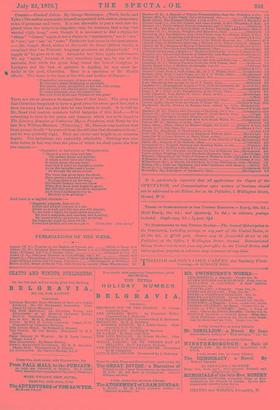Pox:rim—Poetical Davis. By George Messenger. (Ward, Lock, and Tyler.) The
author must make himself acquainted with certain elementary rules of grammar and verse. It is not allowable to put a verb into the plural when the subject is singular,—say, for instance, that a dog "his wonted vigils keep," even though it is necessary to find a rhyme for " sheep." "Comes," again, is not a rhyme to "myrmidons," nor is " are " to "our," nor " son " to "come." These two last occur in the same stanza. —Mr. Joseph Mead, author of Alexander the Great (Elliott Stock), is surprised that "no Teutonic language possesses an Alexandroid." "I supply it," he goes on to say. Alexander has been again unfortunate. We say " again," because it was remarked long ago, by one of the ancients, that while the great king found the best of sculptors in Lysippns and the best of painters in Apelles, he was most un-
ik lucky in his poet, Choerilus. Here is a specimen of Mr. Mead's efforts. Tho scene is the tent of the wife and mother of Darius :—
"Unmindful, seemingly, of fears to come,
To fortune's phase disdaining to succumb, The Queen, mute, thoughtful, to her son, still young,
But six years old, affectionately clung,—
Of Asia's kingdom once the hopeful one,
But now from Mede and Persian all was gone."
There are about nineteen thousand lines of this kind. The story runs that Choerilus bargained to have a good price for every good line, and a blow for every bad one, and that he was beaten to death. It is well for Mr. Mead that modern manners forbid bargains of this kind.—It is refreshing to turn to the grace and humour which are to be found in The Literacy Remains of Catharine Maria Fanshawe, with Notes by the late Rev. William Harness. (Pickering.) Mr. Harness was anxious that these poems should "be rescued from the oblivion that threatened them," and he was perfectly right. They are clever and bright in no common degree. The imitations are especially admirable. Nothing was ever done better in this way than the piece of which we shall quote the first two stanzas:—
"FRAGMENT IN IMITATION OP WORDSWORTH.
" There is a river clear and fair, `Tie neither broad nor narrow;
It winds a little here and there—
It winds about like any hare; And then it takes as straight a course As on the turnpike road a horse, Or through the air an arrow.
The trees that grow upon the shore, Have grown a hundred years or more ; So long there is no knowing.
Old Daniel Dobson does not know When first those trees began to grow; But still they grew, and grew, and grew, As if they'd nothing else to do,
But ever to be growing."
And here is a capital charade :—
,,Higgledy, piggledy, here we lie,
Pulled and picked, and put in a pie.
Divide us in half, and I'm sure you will wonder, To see what a figure we make when asunder.
My first is snappish, and snarling, and howling; My axoad is busy, and active, and prowling.
But higgledy, piggledy, here we lie,
Pulled and picked, and put in a pie.— CURRANTS. [Cur-Ants.)"






























 Previous page
Previous page